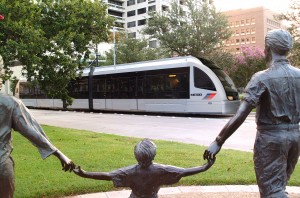
When representatives of US railway companies visited Spain last year to examine the country’s AVE high-speed train system with a view to taking back with them some hints for their own networks, it was a boon to Spanish rail infrastructure. Spanish firms also saw a chance to showcase their cutting-edge technology in the rail and wind turbine industries in the United States when President Obama announced last year that billions of dollars would be available through the job-stimulus Recovery and Reinvestment Act.
But when US transportation officials revealed in early September that one of the Spanish firms to benefit from the US government plan had committed serious violations in cahoots with Houston’s transit authority, things looked less rosy.
Early last year, Construcciones y Auxiliar de Ferrocarriles (CAF) of Beasain, in the Basque Country, signed a $320-million deal to build 105 railcars for the city’s planned extension to its light rail system; much of the financing was to be through federal funds. The Spanish beat major competitors such as Siemens and Alstom Transport to the tender.
But the Federal Transit Administration said that Houston officials violated federal procurement laws and the Buy America requirement when they awarded the railcar contracts to CAF. Following a four-month investigation, the FTA determined that the city’s transportation officials “did not allow for full and open competition” to other bidders, and gave CAF the opportunity “to continue revising its price” while denying other bidders the chance to present their final offers.
The inquiry was opened after the FTA suspected that the city was trying to skirt the Buy America clause, a major component of Obama’s job stimulus law. Products and materials used in these publicly funded infrastructure projects must be made or assembled in the United States. Houston transit asked for a waiver to allow CAF to build the two initial prototype railcars in the Basque province of Guipúzcoa, but the FTA denied the request.
Despite the rejection of the waiver, the city gave the go-ahead to CAF to build the railcars in Spain, according to the FTA inquiry. The US government’s investigation was expanded to look into the procurement process after some losing bidders complained to the FTA that it was flawed.
“The results of the investigation are both alarming and disturbing,” wrote FTA administrator Peter Rogoff in a letter to Houston. “They reveal a series of systematic efforts through which [the city’s transit officials] and CAF sought to bypass numerous federal rules.” Rogoff said that the city should cancel the CAF contracts immediately and reissue the tender if Houston wanted to continue to receive federal funding. CAF has remained quiet on the issue, but a lawyer representing the company in the United States told The Houston Chronicle that the firm would appeal the FTA ruling and suggest that it could take city officials to court for rescinding the contracts. CAF has also asked the FTA for a reconsideration of its decision.
The head of the local transit agency responsible for negotiating the contract, Frank Wilson, resigned in May due to a criminal probe into allegations that he misused taxpayer money to take a female employee on a trip to Spain. Wilson travelled to Bilbao, Seville and Madrid in March 2009 after the contract was signed, apparently to conduct further negotiations. The FTA report highlights the unnecessary nature of the trip.
Other than a possible lawsuit from CAF, it isn’t clear whether there would be further legal repercussions stemming from the FTA inquiry. Houston city officials have said they will comply with the federal government’s demand and cancel the CAF contract even if it means postponing its light rail expansion by a few years.
A version of this article was originally published in Spanish in El País newspaper.
Leave a Reply
You must be logged in to post a comment.